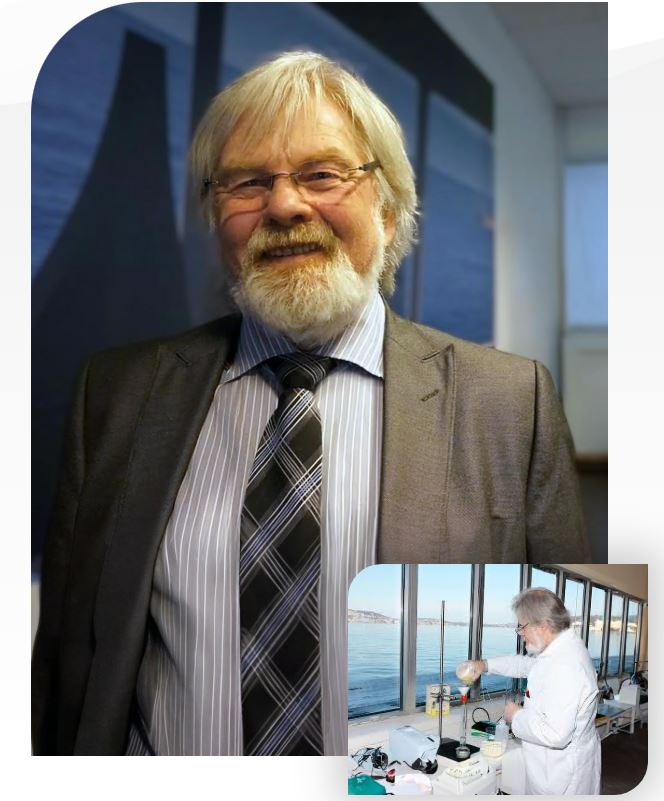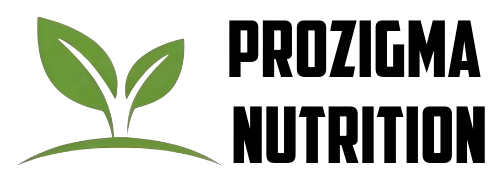Research & Development
ProZigma Nutrition builds all its products on solid scientific foundations. This means that we use knowledge collected and approved by major scientific organisations, which comes from extensive studies and research reports.
In our products, we only choose ingredients that meet pharmaceutical standards or the highest quality found in foodstuffs. We prioritize Norwegian ingredients, but when this is not possible, we source materials from the EU or Great Britain. We prioritize Norwegian goods, but when this is not possible, we source materials from the EU or Great Britain.
All products are manufactured in Norway, in close collaboration with renowned and certified producers.

For information about our research and work, we refer to our academic manager, Einar Lied (see below).

Einar Lied
Einar Lied
Research and Developement responsible
As the professional responsible, I hold a Cand. real. and Dr. Philos. in nutritional biology from the University of Bergen. My career includes many years of work as a senior researcher at the former nutrition institute in Bergen, and now I serve as professor emeritus in nutrition at the same university.
I have worked with issues related to proteins, peptides and amino acids in the diet, both through experimental research and practical application. This includes the development of various functional nutritional products to combat malnutrition in children and young people in developing countries.
Furthermore, I have focused on products designed for hospitalized patients and for use in top sports, especially with regard to recovery issues.

Education
Mathematical and Natural Science Official Examination
Higher degree in nutritional biology from the University of Bergen, with the grade laudabilis prae ceteris.
Doctoral degree (Doctor Philosophiae) in nutritional biology at the University of Bergen.
The thesis included 8 publications, and had the title: Studies on the Atlantic Cod (Gadus morhua). Digestion and Absorption of Nutrients, and Nutritional Effects on the Protein Synthesis in White Skeletal Trunk Muscle”. The thesis was a nutritional biology/biochemical study of mainly protein uptake and protein metabolism in cod.
Competence Assessments
- Assessed and found competent for university lecturer in nutrition at the University of Oslo.
- Judged based on requirements for professorial competence for researcher 0072/professor.
- Assessed and found qualified for first position (researcher 0071/försteamanuensis).
- Judged competent for a professorship in nutritional biology in connection with an application for the position of head of research.
- Renewed assessment for a professorship in nutritional biology in connection with an application for director of research at the Directorate of Fisheries' Institute of Nutrition (now NIFES).
Competence areas exclusive of teaching
The development of one’s own competence is characterized by employment in a scientific position in a public research institute with ownership in fisheries management professionally placed at the intersection between (1) management, (2) research, (3) teaching and (4) industry as well as an interest in targeted basic research, i.e. research at the interface between distinct basic research and applied research.
Consistent experience over 40 years in R&D primarily related to marine activities with an emphasis on marine raw materials and marine products, fish nutrition related to feed composition, nutrition and health related to protein and amino acids, since 1990 also the use of marine products in health work in developing countries, biotechnological processing of marine raw materials with an emphasis on enzymatic processing related to proteins, peptides and nucleotides, analysis methodology related to proteins, peptides, amino acids, amines and nucleotides as well as animal experimental activities related to protein problems and clinical field studies with children related to health and nutrition in developing countries.
- In-depth knowledge of fisheries management and research (1) management, (2) institutions and networks and (3) funding.
- Competence related to innovation and industry-related research through several user-led research projects related to the development and utilization of marine products and raw materials.
- Competence in biochemical, immunological and physiological research methodology, including experimental methods and models with animals and humans. The competence also includes enzymology, and analytical and preparative separation techniques, particularly for proteins, peptides, amino acids, nucleic acids and nucleotides.
- Broad expertise in food analysis as well as chemical, biochemical, immunological, microbiological and biological analysis methodology.
- Broad experience in various types of preparative and analytical separation techniques.
- Competence related to the development and execution of bioprocesses based on industrial enzymes and enzyme technology.
- Public approval for the use of animals in experimental activities according to new EU rules (Laboratory Animal Science for FELASA category C researchers).
- Expertise in nutrition and feeding in fish with special emphasis on cod, particularly in nutritional requirements, feeding regimes and forage optimisation, biochemistry and physiology related to growth, development and metabolism of nutrients as well as digestion and absorption of nutrients; research related to protein, peptide and amino acid turnover has been emphasized.
- As the main person responsible for research projects, acquired expertise in the preparation of project applications to various public funding institutions, project and research administration as well as project collaboration with other research institutions and industrial companies.
- Expertise in the area of ”nutrition and health” with special emphasis on marine products in the diet.
- Competence related to the implementation of nutrition/health research and larger field studies with malnourished/malnourished children in developing countries; the research has particularly focused on the use of protein concentrates from fish as a supplement in traditional African foods and diets aimed at
against iodine deficiency/goiter, and protein/energy malnutrition. - Inngående kompetanse knyttet til økt verdiskapning basert på marine biprodukter både anvendt i fór til fisk, og for utvikling av produkter til humant bruk; kompetanser er særlig knyttet til protein og peptidkonsentrater fremstilt ved enzymatisk hydrolyse (ved hjelp av industrielle proteaser), og til
nucleotides from fish milk. - Patenting and development of IPR (Intellectual Property Rights) through the development of own patents and patents for other businesses.
- In-depth experience in entrepreneurial activity and marine business development, including financing and marketing work through the establishment and development of a separate marine biotechnology R&D and production company (NutriMarine Life Science AS) linked to innovation based on marine ingredients (primarily peptides and nucleotides) used in special nutritional preparations and dietary supplements.
- In-depth experience in product development based on marine raw materials and ingredients with an emphasis on marine proteins, peptides and nucleotides.
Study & Scholarship
- In the period 1979 to 1985, a long series of guest researcher stays at the Wenner-Grens Institute for Experimental Biology, Department of Cell Physiology, Stockholm University to conduct studies of protein synthesis in fish muscle related to nutrition and growth as well as to study the connection between nutrition and synthesis of contractile muscle proteins in relation to quality of fish fillet and fish growth.
- In the period 1985 visiting researcher at the Institute of Marine Biochemistry, Aberdeen, Scotland, to carry out studies of protein synthesis in fish muscle related to nutrition and growth.
- Nordic Council of Ministers research grant in 1984.
- NFFR’s research grant in 1985.
Assessment Committees
- 1989
Member of the committee for competence assessment (professor) of applicants as research director at the Center for Aquaculture, Institute of Marine Research. - 1992
Head of the committee for the assessment of Karl Shearer for the dr.philos degree, University of Bergen. - 1992
Member of committee and 1st opponent for assessment of Einar Ringø for the dr.philos degree, University of Tromsø. - 1992
Member of the committee and 1st opponent for the evaluation of Jan Olli for the degree of Dr. Scientist, Norges Landbrukshøgskole, Ås. - 1995
Head of the committee for the assessment of Amund Måge for the dr.scient degree, University of Bergen. - 1995
Head of committee for assessment of Dr. Anders Kiessling for docent competence at the Swedish University of Agriculture, Uppsala. - 1997
Leader of the committee for the assessment of Friede Andersen for the dr.scient degree, University of Bergen. - 1998
Head of committee for assessment of Ragnar Nortvedt for the dr.scient degree, University of Bergen. - 2006
Member of committee and 2nd opponent for assessment of Oddrun Gulbrandsen for the dr.scient degree, University of Bergen.
Teaching Administration and Planning
- 1988-1993
The Institute of Nutrition’s faculty contact opposite the University of Bergen, Faculty of Nutrition. Built up together with colleagues structure and subjects in nutrition-related subjects and majors in nutritional biology at the University as it functioned until reorganization in 1998. - 1994-1998
Erasmus/Socrates contact person at the University of Bergen within marine biology in network collaboration between universities in the EU/Iceland/Norway (Erasmus-Socrates Marine Biolgoy ICP; coordinated from University of Aberdeen, Scotland). - 1995
Member of the committee/working group for the organization and initiation of Copernicus Lectures, a satellite-based teaching/lecture collaboration (distance learning) between the Universities of Bergen, Baltimore-USA and Gothenburg-Sweden.
R&D projects: Development and Responsibility
Consistent experience over 40 years within R&D primarily related to marine activities with an emphasis on marine raw materials and marine products, fish nutrition related to feed composition, nutrition and health related to protein and amino acids.
Since 1990 use of marine products in health work in developing countries, biotechnological processing of marine raw materials with an emphasis on enzymatic processing related to proteins, peptides and nucleotides, analysis methodology related to proteins, peptides, amino acids, amines and nucleotides as well as animal experimental activities related to protein- problems and field studies related to health and nutrition in developing countries.
1977-1979 | Digestion and nutrition in cod.
Norway’s Fisheries Research Council, collaboration between the Directorate of Fisheries’ Institute of Nutrition and the Institute of Marine Research.
1979-1980 | Protein synthesis in cod.
Researcher-led project funded by the Norwegian Fisheries Research Council.
1980-1983 | Nutrition and protein synthesis in cod.
Researcher-led project funded by the Norwegian Fisheries Research Council.
1984-1985 | The Bjugn project; an investigation to shed light on the importance of nutrition in connection with outbreaks of Hitra disease in salmon.
User-managed project funded by the Norwegian Fisheries Research Council, the Ministry of Fisheries and several industrial companies.
1984-1986 | Pre-optimization for farmed cod.
Researcher-led project funded by the Norwegian Fisheries Research Council.
1986-1987 | Hospital food – a double-portion survey of the main meals at the central kitchen, Haukeland Hospital, Bergen. sentralkjøkkenet, Haukeland Sykehus, Bergen.
The Directorate of Fisheries’ Institute of Nutrition and Haukeland Hospital. Project collaboration to shed light on the use of fish and fish products in the context of commercial kitchens.
1988-1990 | Protein in feed for farmed cod.
Researcher-led project funded by the Norwegian Fisheries Research Council.
1989-1992 | Protein turnover in farmed fish.
Collaboration between the Directorate of Fisheries’ Institute of Nutrition and Wenner-Gren’s Institute for Experimental Biology funded by the Nordic Council of Ministers.
1991-1994 | Nutritional biology research.
Sub-project under the researcher-led program Release of cod in fjords; ecology, population dynamics and nutritional biology, which was part of the Culture-conditioned fishing for cod in Nord-Hordaland funded by the PUSH programme. Collaboration between the Directorate of Fisheries’ Institute of Nutrition, the Institute of Marine Research and the Institute of Fisheries and Marine Biology.
1993-1995 | Amino acid requirements of Atlantic salmon.
Researcher-led project funded by the Research Council of Norway – The Marine Program. Collaboration between the Directorate of Fisheries’ nutrition institute and the feed industry (Felleskjøpet Havbruk AS, now Ewos in Dirdal).
1993-1994 | Artificial bait for line.
User-managed project financed by the Efficiency Funds/NFR. Collaboration between the Directorate of Fisheries’ Institute of Nutrition, the Institute of Marine Research and Mørenot AS.
1995-1996 | Emergency aid products – use of fish by-products.
Research-led investigation project funded by Bergen Municipality, Business Development and Industry Funds and G.C. Rieber & Co and Rieber & Søn AS/TORO.
1995-1997 | In vivo and in vitro evaluation of protein in fish feed.
User-controlled project funded by the Research Council of Norway. Collaboration between the Directorate of Fisheries’ nutrition institute and the feed industry (Felleskjøpet Havbruk AS, now Ewos in Dirdal).
1994-1997 | Evaporated silage in feed for farmed fish.
User-controlled project funded by the Research Council of Norway – The Innovation Programme. Collaboration between the Directorate of Fisheries’ Institute of Nutrition, G.C. Rieber AS and food industry (Felleskjøpet Havbruk AS, now Ewos in Dirdal).
1997-1999 | Products from marine by-products for human consumption.
User-controlled project financed by the Norwegian Research Council-Næringmiddel program. Collaboration between the Directorate of Fisheries’ Institute of Nutrition, G.C. Rieber & Co and Rieber & Søn AS/TORO.
1998-1999 | A holistic view of fish.
Researcher-led project funded by the Nordic Council of Ministers, Environment and Fisheries.
1992-2000 | Processing of protein foods to improve nutrition and health. Researcher-led project funded by the Norwegian University and College Council’s national committee for development-related research and education – NUFU. Cooperation between
The Directorate of Fisheries’ Institute of Nutrition, Center for International Health/University of
Bergen and Department of Nutrition and Food Science, University of Ghana,
Accra/Ghana
1999-2000 | Aquaculture, Nutrition and Health.
Researcher-led project funded by the University of Bergen – Faculty of Mathematics and Natural Sciences/developing countries programme. Cooperation between
The Directorate of Fisheries’ Nutrition Institute, Center for Environment and Resources/UiB, Center for
international health/UiB and Makerere University, Kampala, Uganda.
1997-2001 | Nutrition and increased growth rate in salmon.
Researcher-led project funded by the Aquaculture Programme. Collaboration between the Directorate of Fisheries’ nutrition institute and the feed industry (Noraqua Innovation AS, now Ewos in Dirdal).
1997-2000 | Processing and feed quality of fish silage.
Researcher-led project funded by the NORAD/Bei Dou programme. Collaboration between the Directorate of Fisheries’ Institute of Nutrition, the Institute of Marine Research, the Institute of Fisheries and Marine Biology and the Yellow Sea Fishery Research Institute, Qingdao, PR China.
1998-2000 | Nucleotides from fish milk – effects on nutritional status.
User-controlled project funded by the Research Council of Norway, industry and SND (now Innovation Norway). Collaboration between the Directorate of Fisheries’ Institute of Nutrition, Broegelmann’s Research Laboratory/University of Bergen/Haukeland Hospital, Bjørge Biomarin AS (now Firmenich Bjørge Biomarin AS), Ålesund and the Department of Nutrition and Food Science, University of Ghana, Accra, Ghana.
1999-2000 | Increased value creation from salmon by-product – fat/protein interactions User-controlled project funded by the Norwegian Research Council/Biotechnology Program and Industry. Collaboration between the Directorate of Fisheries’ Institute of Nutrition, Department of Clinical Biochemistry/Haukeland University Hospital/University of Bergen and Hordafór AS, Austevoll.
2017-2020 | Documentation of physical effects and qualities of marine protein hydrolysates in sport and sarcopenia.
User-driven innovation project (BIA) funded by the Research Council of Norway; project owner Firmenic Bjørge Biomarine AS with the undersigned as project manager/project manager. The project was a collaboration between Firmenich, Center for Nutrition/University of Bergen, Haukeland University Hospital/K2, and Ålesund Hospital-Clinical Research Post/HF Møre og Romsdal.
Commercial Activity: Development and Responsibility
2002-2011 | NutriMarine Life Science AS.
Gründerselskap established a partnership with TINE SA in 2002 with the undersigned as main founder, largest owner and general manager.
Objective: development and establishment of hydrolysis technology for the production of marine protein hydrolysates/peptides with functional properties aimed at special nutrition within clinics, sports and geriatrics, as well as obesity and the GI market.
The company developed and established its own production technology of marine hydrolysates as a functional ingredient in foodstuffs aimed at reducing blood sugar and the glycemic index in foodstuffs.
2011-2017 | Science in Nutrition NUF/Ltd.
Founder company established in 2011 in collaboration with local investors and with the undersigned as main founder, professional manager and general manager.
Objective: development of nutritional preparations based on marine ingredients, including protein hydrolysates/peptides and marine nucleotides with functional properties aimed at special nutrition in clinics, sports and geriatrics, as well as obesity and the GI market.
The company developed and established its own products in the market for recovery (Recover Sport) and performance (Booster Sport) in sports, EPA+ Omega3 (- a combined krill oil and fish oil product), products aimed at joint health (LeddOmega) as well as a medical product (Recover clinic) for dietary treatment aimed at specific patient groups, and which was approved by the Norwegian Food Safety Authority and HELFO on a so-called blue prescription.
The sports products were for longer periods used by both Team CSC and Team Sky in professional cycling, a number of top Norwegian cyclists, in ice hockey, by top-level Norwegian swimmers, in football and by the Norwegian Himalayan expedition.
2013-2016 | Board member of Firmenich Bjørge Biomarine AS, Ellingsøy/Ålesund.
Responsibility for research and development of marine peptides and nucleotides.
2016-2020 | Scientific advisor for Firmenich SA, Geneva/Switzerland.
Linked to the company’s sister company on Ellingsøy/Ålesund with project responsibility related to research, development and application of marine peptides and proteins in a health context
